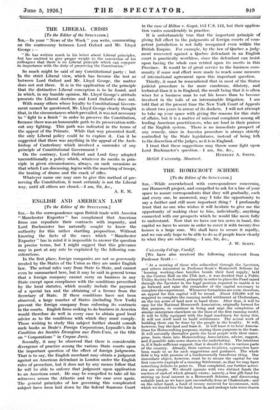ENGLISH AND AMERICAN LAW
. [To the Editor of the SPECTATOR.]
SIR,—In the correspondence upon British trade with America " Manchester Exporter " has complained that American firms can repudiate their contracts with impunity, and Lord Buckmaster has naturally sought to know the authority for this rather startling proposition. Without knowing the facts of the cases which " Manchester Exporter " has in mind it is impossible to answer the question in precise terms, but I might suggest that this grievance may in part at any rate be explained by the following con- siderations.
In the first place, foreign companies are not so generously treated by the States of the Union as they are under English law. The actual rules vary from State to State, and cannot even be summarized here, but it may be said in general terms that a foreign company cannot carry on business in any 'State except upon compliance with the conditions prescribed by the local statutes, which usually include the payment of a special tax and the obtaining of a licence from the Secretary of State. If these conditions have not been observed, a large number of States (including New York) prevent the foreign company from enforcing its contracts in the courts. English firms seeking to do business in America would therefore do well in every case to obtain good local advice as to the conditions with which they must comply. Those wishing to study this subject further should consult such- books as Beale's Foreign Corporations, Lepaulle's De to Condition des Socials Etrangeres awe Mats-Unix, or the title on " Corporations " in Corpus Juris.
Secondly, it may be observed that there is considerable divergence of practice among the various State courts upon the important question of the effect of foreign judgments. That is to say, the English merchant may obtain a judgment against an American defendant in London under the English rules of procedure, but it does not by any means follow that he will be able to enforce that judgment upon application to an American court. He may be compelled to take all his witnesses across the Atlantic and try the case over again. The general principles of law governing this complicated subject -have been laid down by the federal Supreme Court in the case of Hilton v. Gap!, 115 U.S. 113, but their applica- tion varies considerably in practice.
It is unfortunately true that the important principle of giving full effect to the judgments of foreign courts of com- petent jurisdiction is not fully recognized even within the British Empire. For example, by the law of Quebec a judg- ment recovered against a Quebec defendant in an English court is practically worthless, since the defendant can insist upon having the whole- case retried upon its merits in this Province. It would be of great service to the business com- munity if some real effort were made to reach some measure of international agreement upon this important question.
Thirdly, it must be remembered that in most of the States judicial procedure is far more cumbrous, dilatory, and technical than it is in England, the result being that it is often wiser for a business man to cut his losses than to become involved in the toils of an interminable litigation. I am told that at the present time the New York Court of Appeals is about two years in wear of its dockets. I will not attempt to take up your space with giving the reasons for this state of affairs, but it is a matter of universal complaint among all leading American practitioners, who are loud in their praises of the English system. There is no immediate prospect of any remedy, since in America procedure is always strictly controlled by the State legislatures, instead of being left to the diScretion of the judges, as it is in England.
I trust that these suggestions may throw some light upon Lord Buckmaster's question.—I am, Sir, &c.,










































 Previous page
Previous page